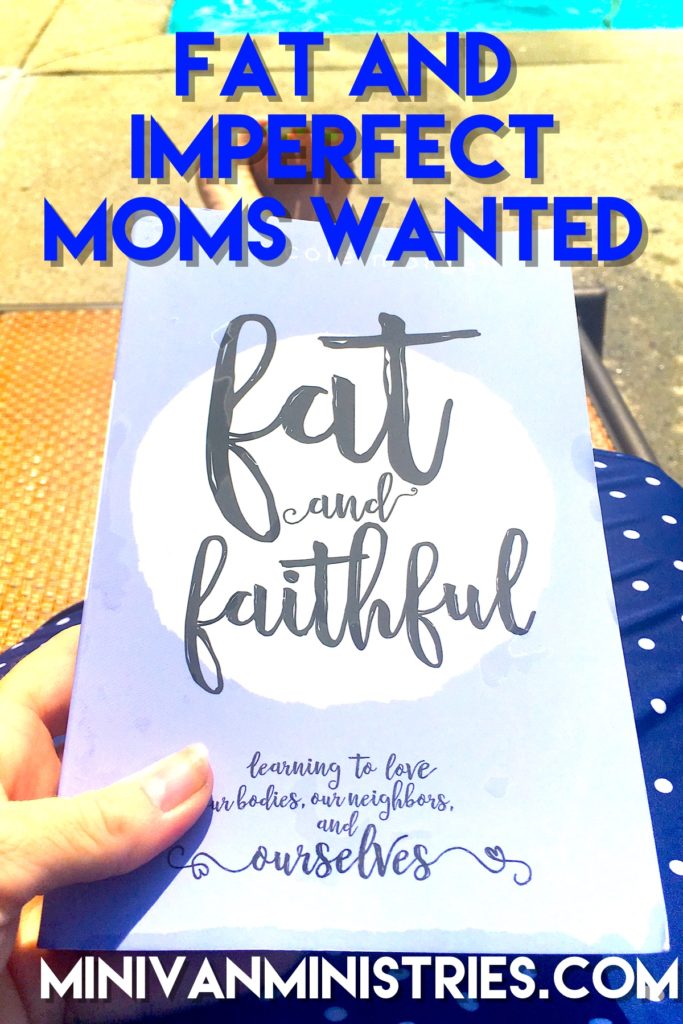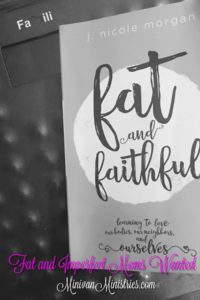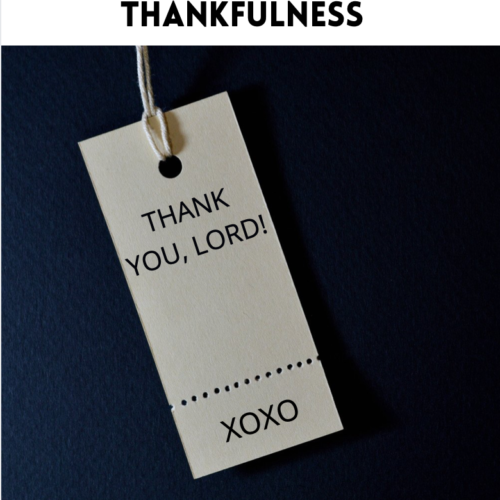Most of us have been there. Perhaps you don’t feel fat, but you feel something–something that makes you feel less than. Here we are, faced with a new school year or some new opportunity. Yet something whispers in your ear, “You aren’t enough. You aren’t going to accomplish these things. You’ve never been enough.” I have news for you…That is completely untrue. You are wanted. Fat or flawed, in spite of your imperfections, God wants you. He is holding up a sign, asking you to join Him in His work…”Fat and Imperfect Moms Wanted.”
Do not be conformed to this world, but be transformed by the renewal of your mind, that by testing you may discern what is the will of God, what is good and acceptable and perfect.” Romans 12:2 ESV
Can You Really Be Both Fat and Faithful?
Hopeful, Yet Skeptical
When I first picked up the book Fat and Faithful: Learning to Love Our Bodies, Our Neighbors, and Ourselves by J. Nicole Morgan, I was both hopeful and skeptical. I was hopeful that it would offer some reassurance and peace in a world where I am constantly reminded that I could be thinner, prettier, healthier, and just “more” in general. I remained skeptical, however. A few people spouting that we need to love our bodies as we are, but is that real? Aren’t we supposed to be healthy and take care of our bodies, God’s temple?
I was happy to see that J. Nicole Morgan addressed this issue right away in the introduction. She too used to believe that she was not in God’s will as long as she was overweight (a.k.a. fat). She also explained why she uses the word fat so frequently throughout the book–and why I will use it during this post. Here is an excerpt…
I use the word fat specifically and intentionally throughout this book. Fat is an adjective. It speaks to the amount of flesh on a person’s body. From a social/political context, this self-naming as fat is about destigmatizing fat bodies and pushing back on the way fat bodies are treated. I reject terms such as overweight because the word contains an inherent judgement that there is a correct weight. p.xix
Hope Wins Out
I was pleased to discover that J. Nicole Morgan was not, in fact, ignoring the facts and just saying to accept who you are. She delved deep into history and traditions. She looked at the original context of the Bible and broke down some common thought patterns that we may have once held as biblical.
God cares about our broken hearts, not the wideness of our calves. I stubbornly choose to believe that God is about restoring broken things…Any theology that sees first the size of someone’s hips cannot be the message of a God who showed up on earth and taught us to love our neighbors as ourselves. p.XXI

 Common Misconceptions
Common Misconceptions
Wanting more brownies, is not in and of itself an evil thing. But maybe not offering them to my shut-in neighbor who I know loves chocolate is. Click To Tweet
Misconceptions About Gluttony
Most of us think of gluttony as eating too much and not knowing when to stop.
From what I see in scripture, gluttony is in fact consumption at the expense of someone else, especially the poor and marginalized. Christianity is about loving God and our neighbors. There is no room in that commandment for an obsessive regard for the size of our body, but there is plenty of room to pay attention to how our actions affect others. P.63-64
I don’t know about you, but that puts gluttony in a whole new perspective for me. It makes total sense, yet I had never thought of it that way. Wanting more brownies, is not in and of itself an evil thing. But maybe not offering them to my shut-in neighbor who I know loves chocolate is. Driving by the homeless man with the hungry sign to buy my extra large value meal without thinking twice could be categorized as gluttony, but if I share, maybe an extra large value meal is not so bad now and then.
Driving by the homeless man with the hungry sign to buy my extra large value meal without thinking twice could be categorized as gluttony, but if I share, maybe an extra large value meal is not so bad now and then. Click To TweetAvoiding gluttony requires paying attention to your neighbors. It’s a lot harder than just checking the scale each morning. P.73
Misconceptions About Honoring the Temple
Honoring the temple is often thought of as being thin and healthy, perhaps even looking our best. The reason most of us think we should honor the temple is so that we can better serve God. That may reflect a heart God can appreciate, but sometimes we can still serve God in our bodies that are less than thin.
The reason most of us think we should honor the temple is so that we can better serve God. That may reflect a heart God can appreciate, but sometimes we can still serve God in our bodies that are less than thin. Click To TweetFat bodies deserve the same dignity. We can show up and be present at the bedsides of the sick, prepare food or clothing for those who are hungry and cold. We can honor the temple of our body–put in the service of God–in the many ways we are physically present in our community. This dignity does not change, no matter the limits on any person’s body or movements. Those who struggle with painful disease or disabilities have a right to express their pain, to proclaim all the ways that their body does not feel good. Yet even bodies in pain are made in the image of God and are worthy of dignity and respect. P.87
Misconceptions About Health
I have never been super skinny. As a matter of fact, when I felt my healthiest and looked my best, I was still several pounds over what the charts said I should weigh. The first time our doctor cautioned us that my daughter might be a bit overweight, she looked perfectly normal. There are many people who believe that weight charts are not accurate. Scales should hold no power over how we feel about ourselves. They should hold very little power over how we view our health.
There is an organization, Health at Every Size, that Morgan endorses.
This is a holistic approach that asks you to pay attention to your body (energy, strength, endurance, mood, aches and pains, etc.) and to use medical measurements (blood sugar and cholesterol levels, heart and kidney function, etc.) under the care of a physician to determine your health without using weight as the determining factor of whether you are healthy or not. P.103
Morgan tells a story of seeing one doctor who told her, in spite of her fat, that she was the most healthy person she had seen all week. Then she tells of moving and going to another doctor who didn’t even own a large size blood pressure cuff (which measures more accurately for larger people) and tried to immediately put her on blood pressure medication even without any prior history of high blood pressure. Perhaps we would all be happier (and more accurate) if we didn’t judge a person’s health, including our own, by size.
Attention Fat and Imperfect Moms
Fat and Imperfect Moms, This is For You
If you, like me, have struggled with your weight in the past or present, if you have constant thoughts that you could be more pleasing to God, more useful to Him if you were just smaller, please read Fat and Faithful: Learning to Love Our Bodies, Our Neighbors, and Ourselves by J. Nicole Morgan. Maybe you will even win a copy in this giveaway! However you get your copy, you will feel inspired at the end. As moms, we need to accept ourselves and teach our children that we are who God wants us to be. If our children are to follow in our footsteps, we need to give them tools to thwart the lies we hear so often, and know that God is using them and they are beautiful.
Fat and Imperfect Moms Wanted
So what is it for you? What is that thing that makes you feel less than? Are you willing to turn it over to God and trust that you are who He made you to be? You may not be perfect. He isn’t finished with you yet. He can still use you in spite of your flaws. In fact, your flaws show others evidence of God’s grace. Maybe what you have viewed as flaws are not even flaws at all. Let go of your insecurities and let God flourish. You will be amazed at what He can do in and through you. He is holding up a sign, asking you to join Him in His work…”Fat and Imperfect Moms Wanted.”













Leave a Reply